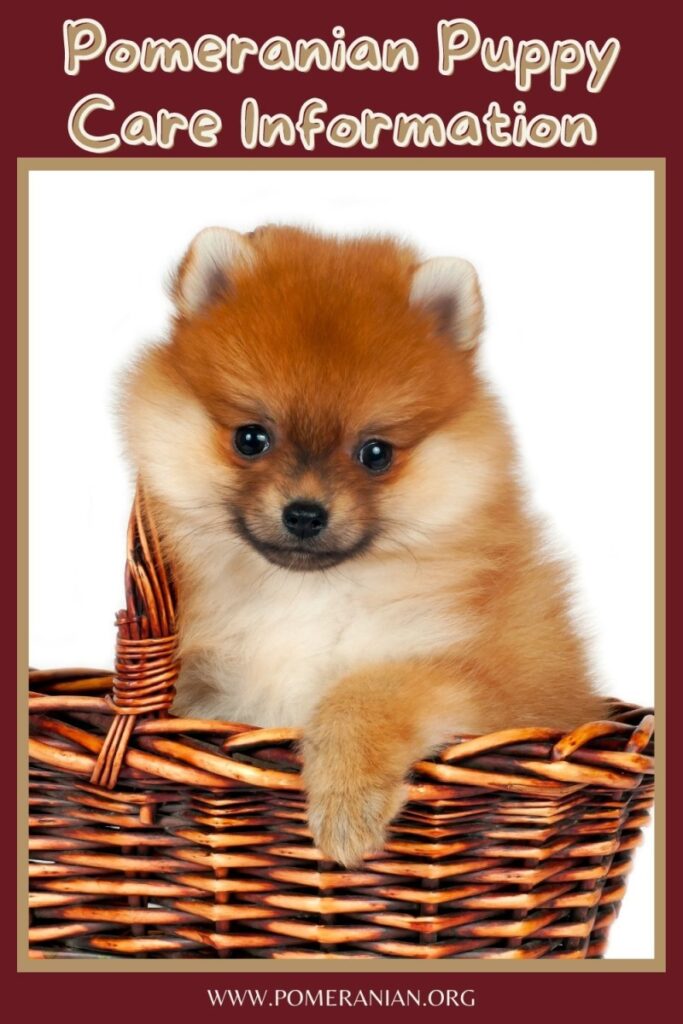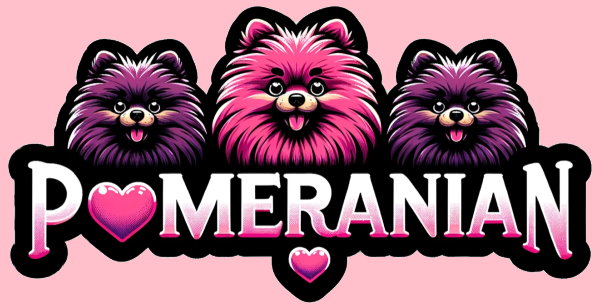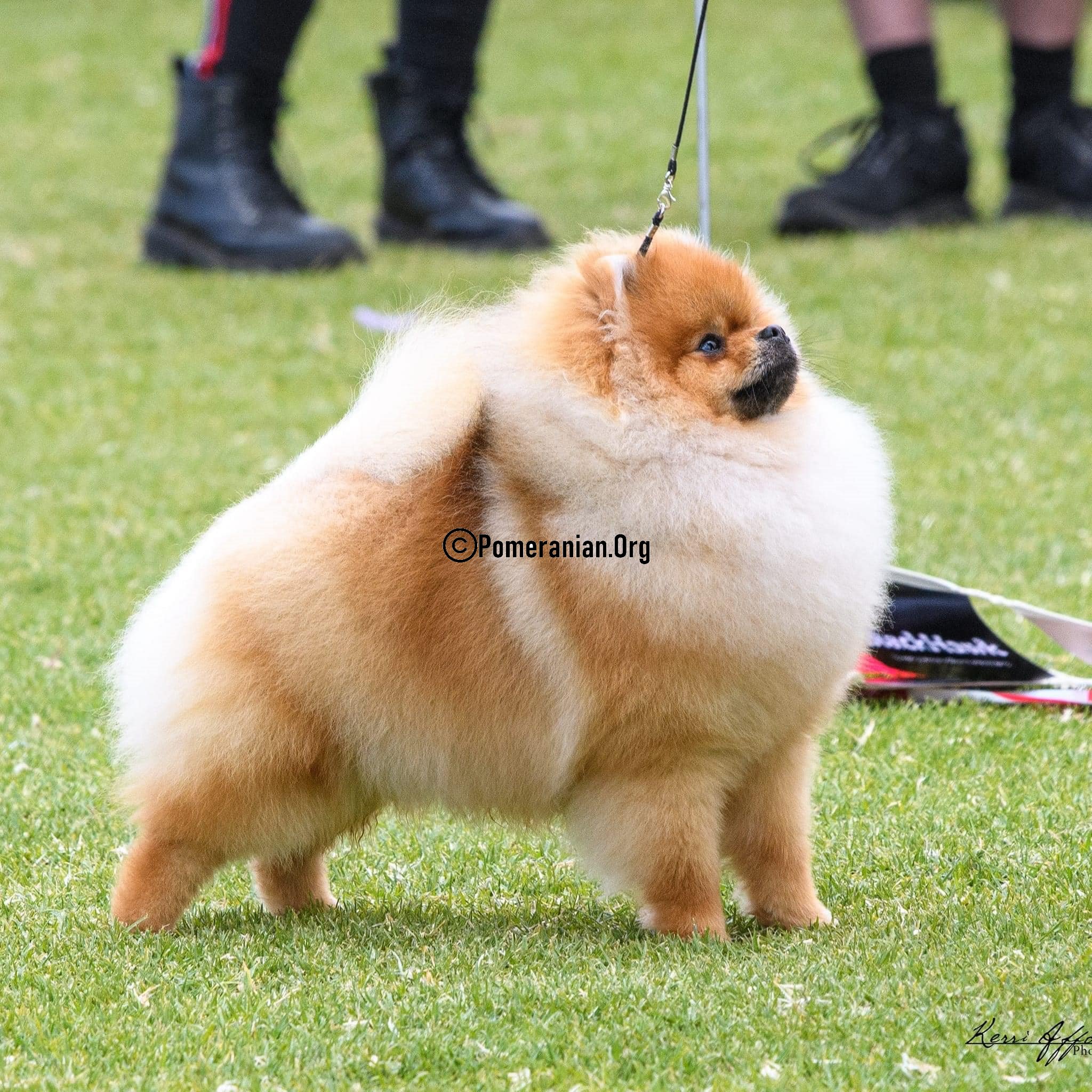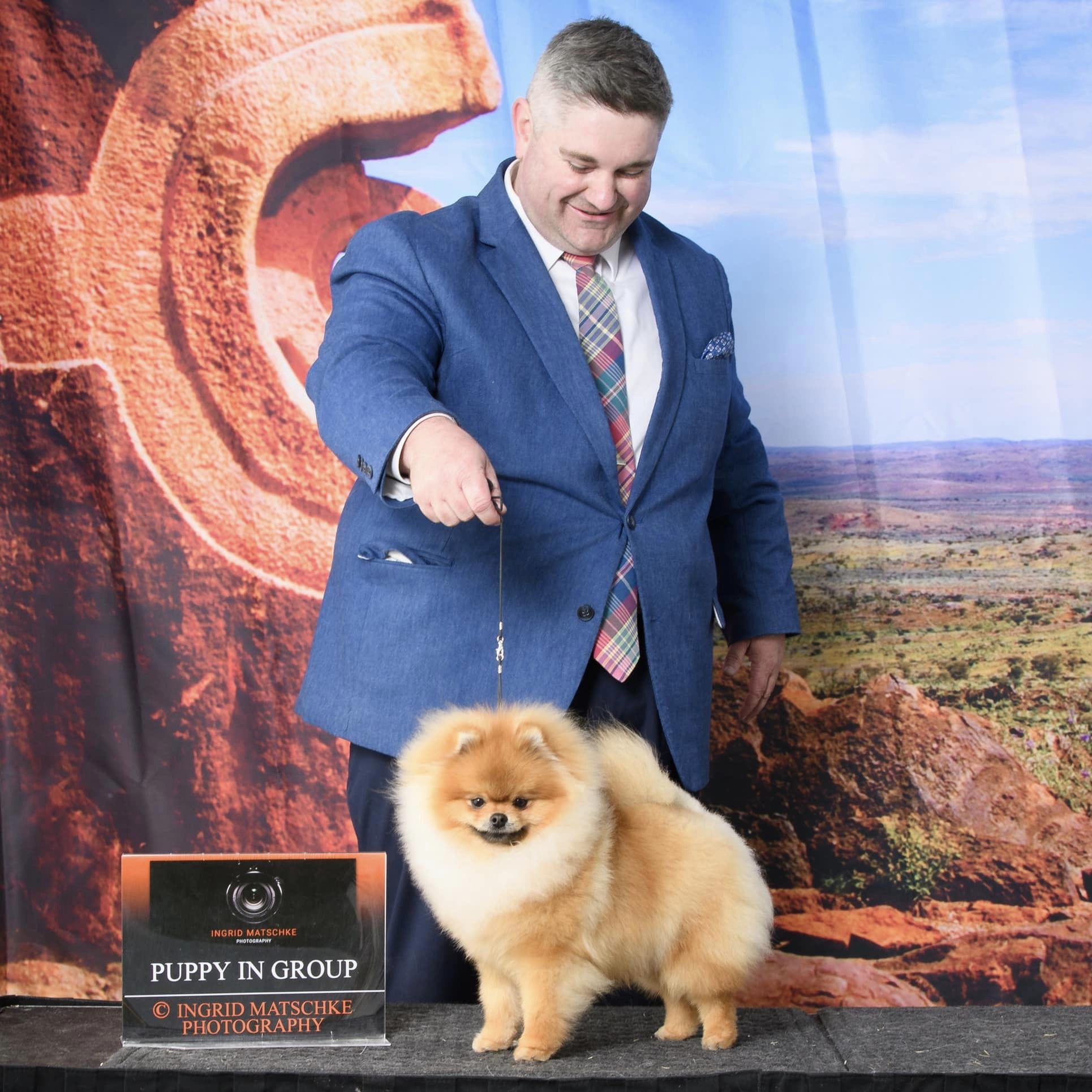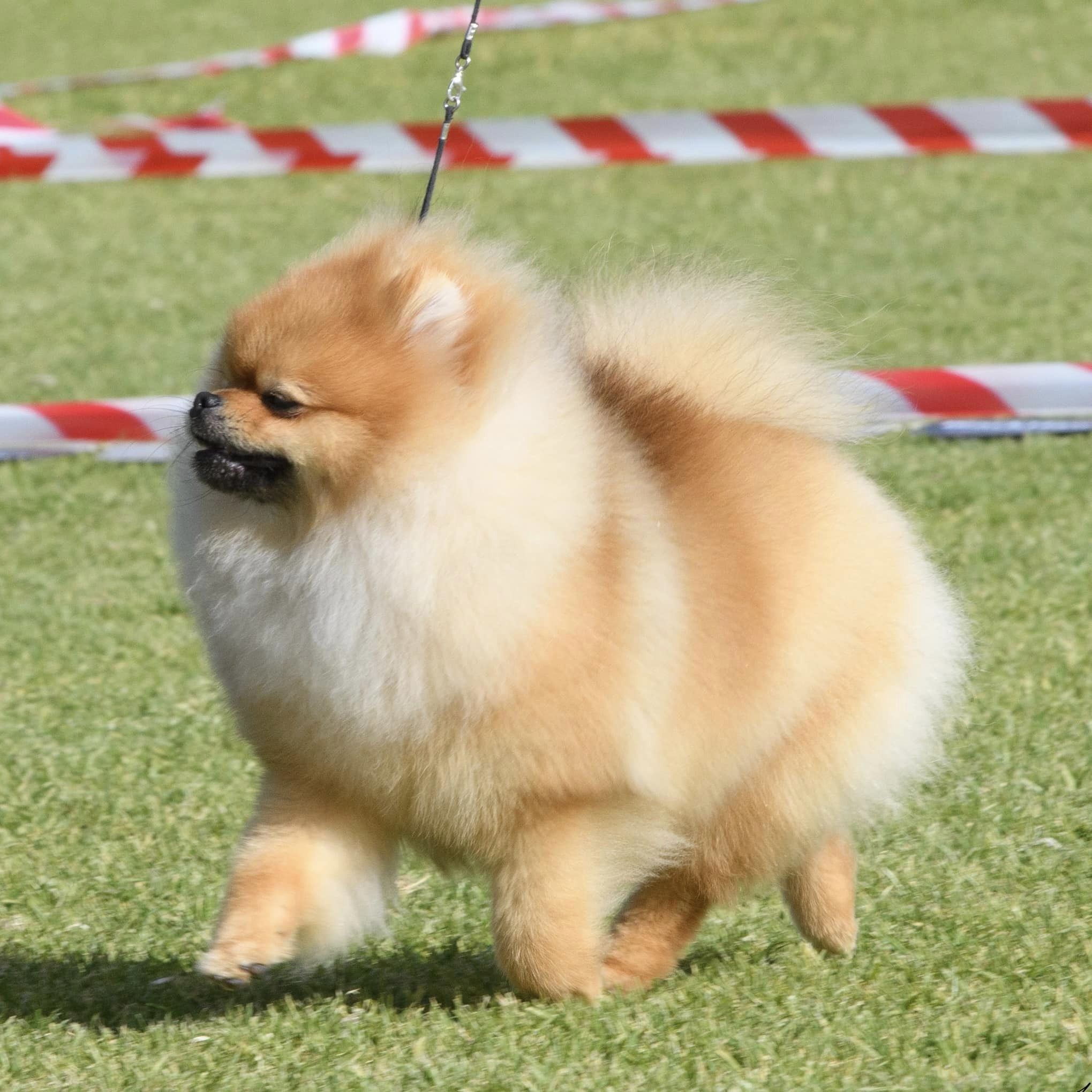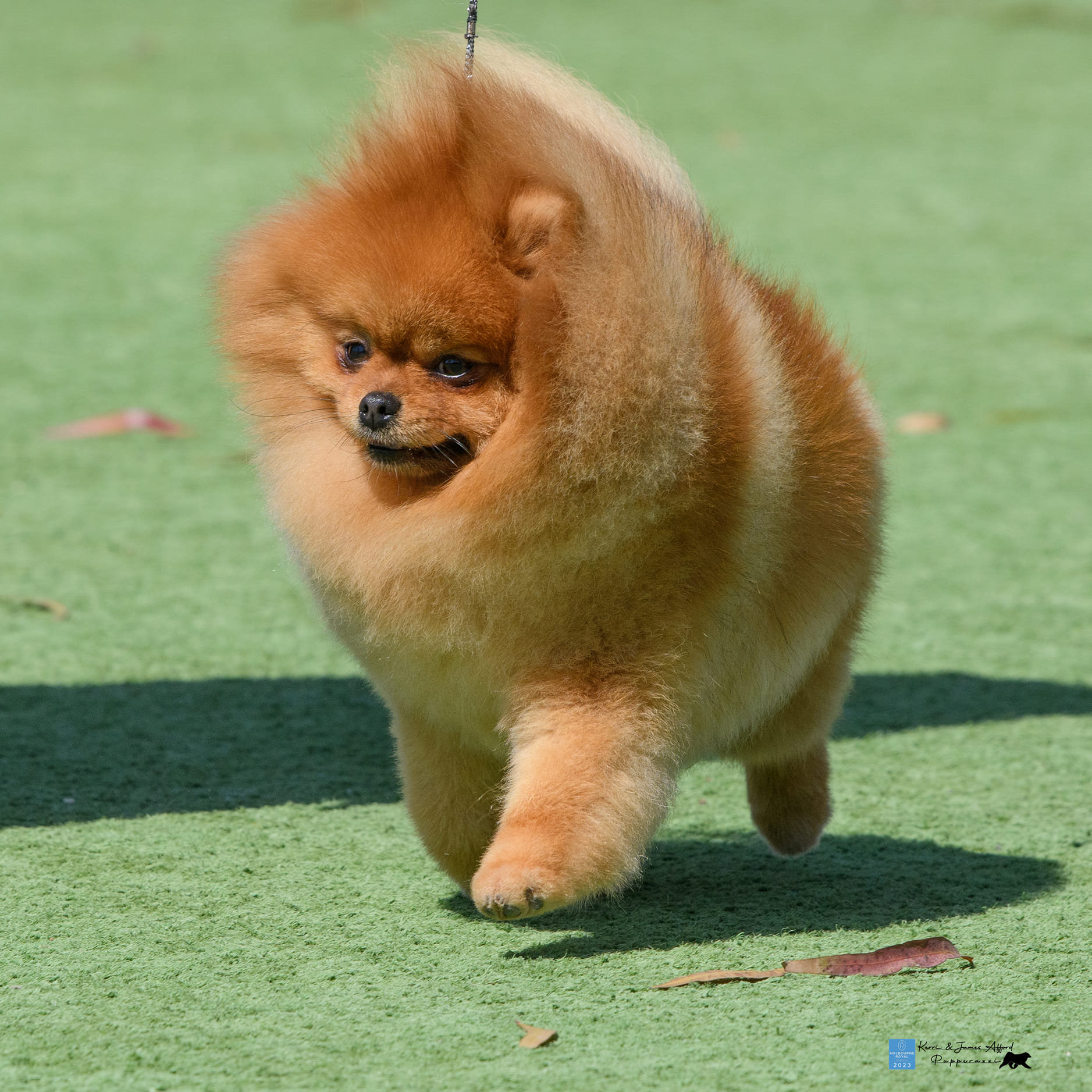Last Updated on 25/04/2024 by Dochlaggie. Post first published on November 16, 2022.
Are you considering getting a Pomeranian puppy? If so, learning how to care for them is essential. In this post, I will discuss some of the basics of Pomeranian puppy care.
Learn how to care for a Pomeranian puppy, correct Pomeranian puppy care, and care for Pomeranian dogs. I will provide you with complete details on how to raise a Pomeranian puppy.
I will tell you everything you need to know before bringing your new pup home, and we will also share essential tips on keeping them healthy and happy. So, if you want to learn more about Pomeranian puppies, keep reading!
New Pomeranian parents will require essential puppy supplies to enable correct Pomeranian care.
Pomeranian Puppy Feeding:
- Pomeranian Puppies under six months should be fed at least three times daily.
- Poms over six months can be fed twice daily.
- Leave dry puppy food and water available 24/7.
- Quality puppy dry food can always be available to the Pomeranian puppy.
Pomeranian Puppy Care Explained
Pomeranian Babies are very small and can suffer from Hypoglycemia if they do not eat small amounts of food often. Just think about how much energy a Pomeranian puppy uses in relation to its tiny size and ability to utilize the food eaten quickly.
Enough nutrients must be also supplied in the diet to provide for growth. A quality diet must be fed, or your Pomeranian’s health and growth will suffer.
Correct feeding of a Pomeranian Baby is to feed a little quality food often. The important words in relation to your Pomeranian Puppy’s food are QUALITY, LITTLE, and OFTEN. Look for dry food suitable for toy breeds of dogs and purchase the puppy variety.
The Pomeranian Puppy should receive three meals daily of a small amount of canned puppy food.
A small Pomeranian Puppy must produce enough energy to run around and play.
Examples of the Diet I use at Dochlaggie for My Pomeranians Puppies:
- Puppy dry kibble and water 24/7
- Canned Puppy food: About a heaped tablespoon, three times daily, with a little milk on top. (Increase the amount fed if the puppy needs more as he grows).
- Clean Water: Placed in a shallow bowl MUST always be available.
- Never feed your Pomeranian puppy cooked bones, chicken wings, or chicken necks.
- Caution should be used when feeding any food that is minced or chopped. Please ensure the food is minced or chopped very fine, as Pomeranians can easily choke on large pieces of meat.
For variety, the following are safe and nutritious options:
- Sardines or tuna.
- Boiled egg.
- Grate cheese on top of the pup’s meal and a warm meal.
- Plain yogurt or cottage cheese is a good addition to increase the calcium in the diet.
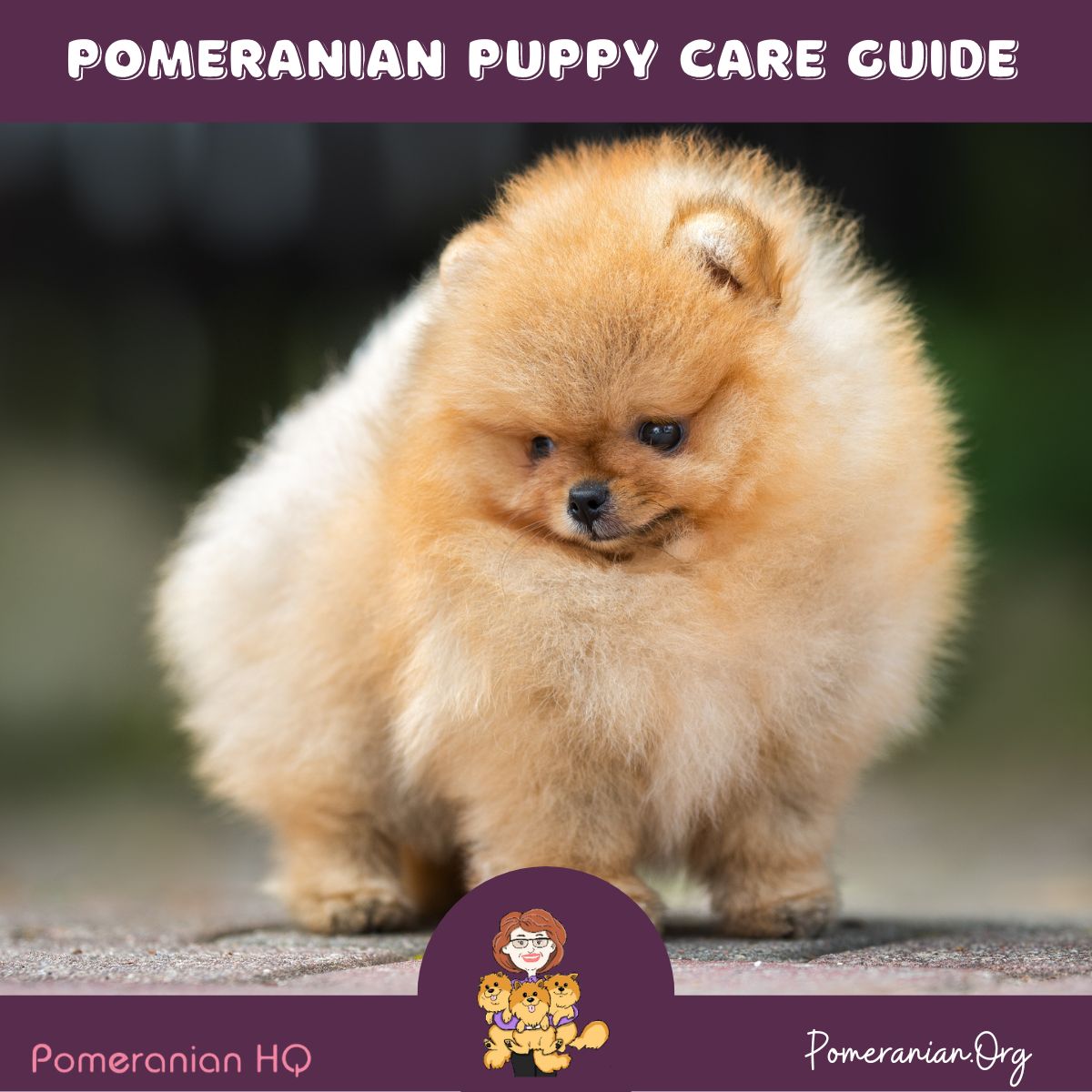
Treats for Puppy Pomeranians:
- Human-grade mincemeat is a very rare treat.
- Small pieces of roast chicken breast, roast lamb, etc.
- Raw bones to chew.
- Small pieces of cheese can be used as training treats.
Your breeder will provide a diet sheet for your puppy.
After 12 months of age, Puppy is classed as an adult dog, and you can download a copy of my book, “Home Cooking for Pomeranians,” and start feeding home-cooked meals.
NEVER GIVE THE FOLLOWING TO A POMERANIAN:
COOKED BONES, CHICKEN NECKS, CHICKEN THIGHS, OR CHICKEN WINGS.
New Pom Parents Should Change Pomeranian Puppies’ Diet Gradually
Do not make any changes to the diet for a few days. The stress of leaving the Pomeranian Puppy’s mother and siblings might be traumatic for the Pomeranian baby, without added stress from changes to diet.
Changing the water your Puppy is drinking can also cause an upset in a Pomeranian’s tummy; using bottled water for your puppy is recommended.
I do not recommend feeding adult Pomeranians solely commercial dog food.
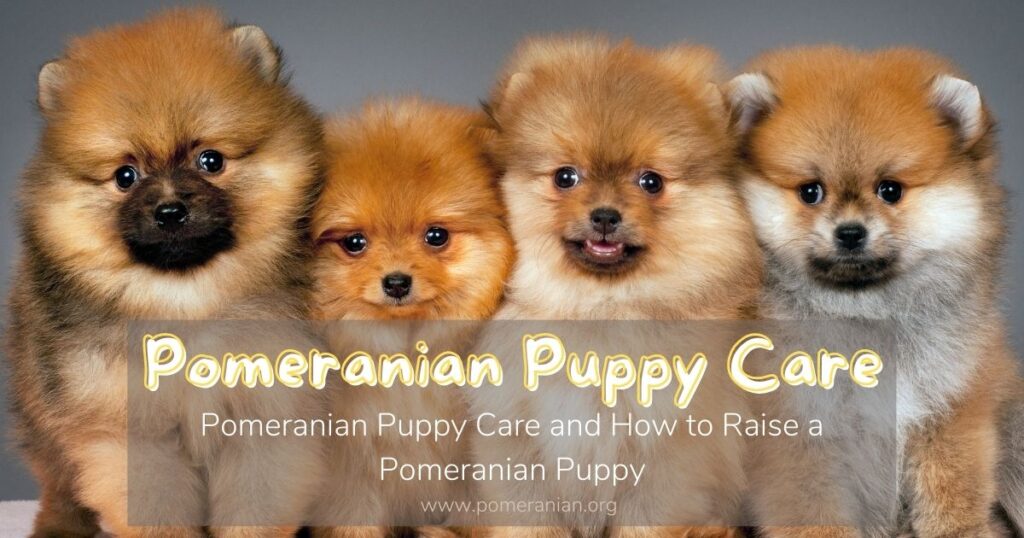
At Dochlaggie Pomeranians, the amount of dry food the Adult Pomeranians eat is limited, feeding mainly a raw meat diet with a small amount of premium dry dog food added for balance and cooked vegetables.
Pomeranian Puppy Proofing Your Home
Any time you adopt a puppy, you must puppy-proof your home as you would when you have a toddler. When it’s time to bring your new Pomeranian home, please remember to take some precautions to create a safe environment for him.
Just because he or she is so tiny and cute doesn’t mean he won’t be curious about everything in sight. A look in those mischievous eyes will be your first clue. Most puppies love to chew, especially when teething, so keep chewable treasures out of reach.
Puppy Proofing Your Home Suggestions:
Recommended Pom Puppy Exercise Pen
Best Pomeranian Playpens- Get down on your hands and knees, grab a flashlight and look around for small things such as rubber bands, children’s toys, or string.
- Do the best you can to hide electrical cords. This isn’t always easy, but in some cases, you can hide them under carpets and rugs.
- Don’t leave any “people food” within your dog’s reach.
- Keep all chemicals in cupboards, and close the doors after you take something out or put something back.
- Don’t forget to stow waste baskets and garbage out of sight and reach.
- Make periodic checks of all of your rooms.
- Sometimes, people forget to put potentially dangerous things away, or they may leave doors open that should be closed. Leave your purses, briefcases, backpacks, and similar items up high or locked up.
- Look up information on your indoor and outdoor plants and flowers. Some are poisonous for Pomeranians.
- If you have cat litter boxes in your home, safely keep them away from your pup.
- If you have collections or memorabilia, you will want to ensure they are on shelves or cabinets out of your Pomeranian’s reach.
- Distract your Pomeranian from being interested in your items by providing toys appropriate to his size and age.
- If you give him things to chew on right from the beginning, you are less apt to find things like your shoes and belt targets for his little teeth.
Bringing New Pomeranian Puppy Home
When you arrive home with your new Pomeranian Puppy, he or she may be nervous—being in a new environment, away from his loving Mother and litter mates. During these first few days, stress may affect some Pomeranian pups considerably.
For the first few days ensure that the baby is eating his food. Too much excitement can cause exhaustion in a young Pomeranian Baby.
Resist the temptation to show off your new Pomeranian Puppy. Your puppy is a baby.
What do babies spend most of the day doing? Sleeping is the answer! So please ensure that your new baby Pomeranian has adequate sleep. Pomeranian Puppies sleep a lot.
Introducing a new Puppy to Other Pets
- If you already have other pets, quietly introduce the new Pomeranian Puppy to the other pets.
- Do not introduce it at meal times.
- Purchase new toys for your other pets and make as much fuss about your other pets as you are doing with your new addition.
Pomeranian Potty Training:
- Puppies have an instinct to be clean.
- The biggest mistake new Pomeranian Puppy owners can make when they bring the new Pomeranian Puppy home—is allowing the Puppy to run the home.
- Confine your new Pomeranian baby until he/she is completely housetrained when not under supervision.
- I keep the Pomeranian puppies confined in a playpen with newspapers at one end, together with a modified kitty litter tray. I place the puppy’s bed, feed, and water bowls at the other end. Always take the baby to your preferred potty spot after feeds and after a night of sleep.
For more details on house training, your new baby Pomeranian, see the section on how to Potty Train a Pomeranian.
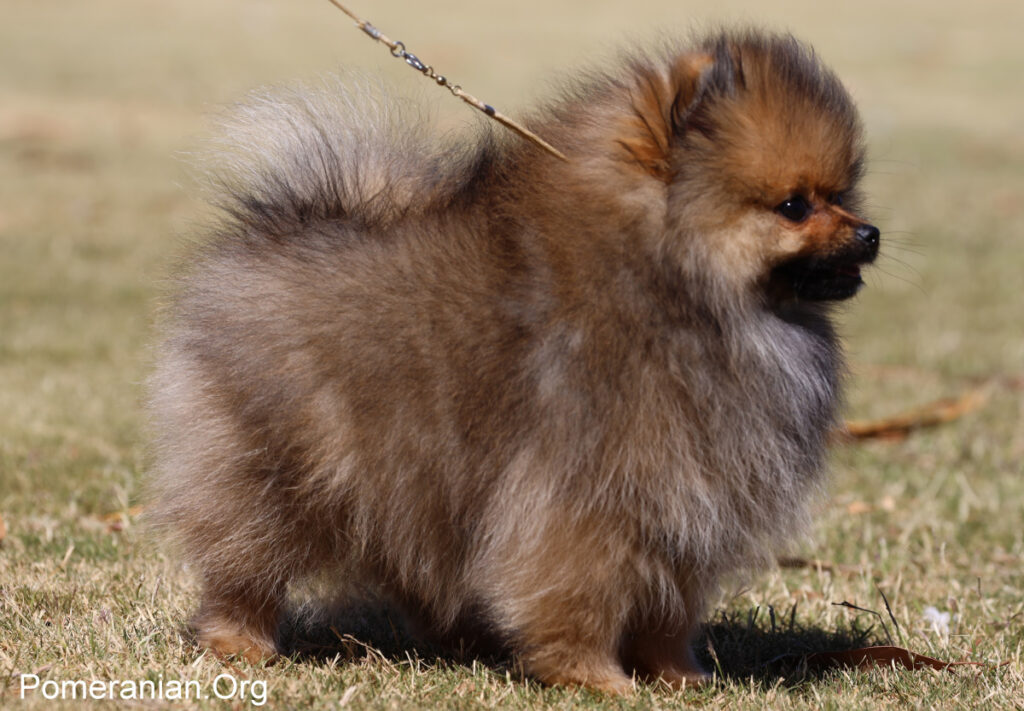
Worming:
Your Pomeranian puppy should have been wormed at 2, 4, 6 & 8 weeks of age. Please ask your vet for advice on future worming and products to use.
Pomeranian Vaccination Schedule:
Puppies love playing with other puppies in any new place, including the beach or park.
However, you must be aware that numerous contagious diseases exist in your puppy’s community. Diseases like Parvovirus are very dangerous to puppies while developing and growing.
You must keep your puppy safe and healthy before allowing him to go out and play in the real world. Being vaccinated is the smart way to protect your puppy.
When your puppy faces the disease, his immune system “remembers” the vaccine’s contents and destroys the infection. This immunity does wear off after a period of time, so your puppy needs regular booster shots during the course of his life.
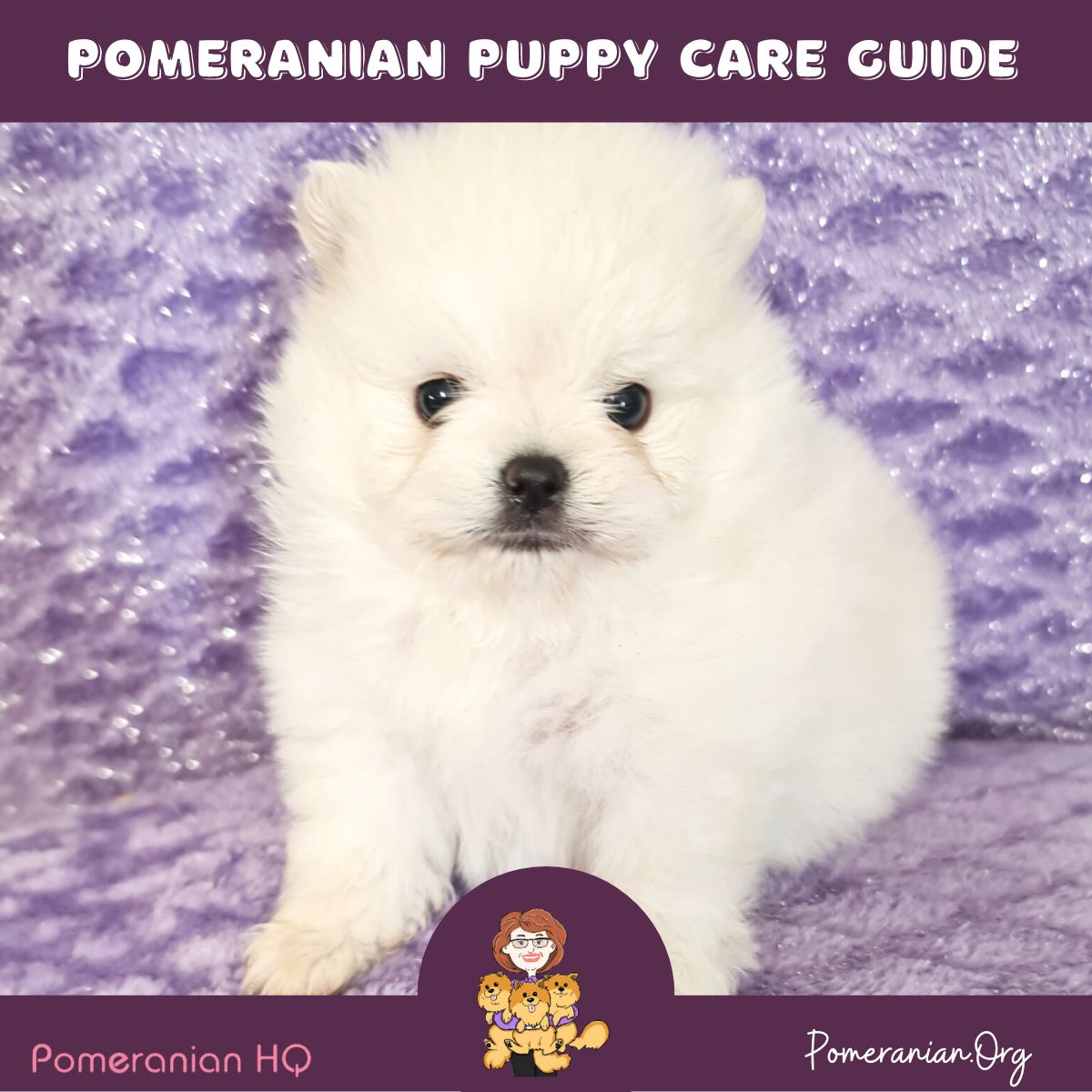
Pomeranian Vaccination Schedule
Your Pomeranian puppy will have been vet-checked and Vaccinated at six weeks of age. You should receive a Vaccination Certificate signed by the Breeder’s veterinarian. The Vaccination card will list the vaccinations Puppy has received to date.
This is an intermediate vaccination until your pup receives its full booster vaccination at 12-16 weeks. Until the full booster at 12-16 weeks, please keep your puppy at home and away from public places because of the chance of contracting one of the deadly canine diseases such as Parvo, Distemper, and Hepatitis.
Parvovirus
Highly contagious viral gastroenteritis causes severe vomiting and diarrhea with some bleeding, loss of appetite, and depression. If not treated, this virus can kill your puppy within 24 hours.
Hepatitis
It can cause sudden death in your puppy. Adult dogs may have diarrhea, fever, weakness, acute abdominal pain because of an enlarged liver, bleeding, and lost appetite.
Distemper
It is extremely contagious and has symptoms including pus discharge from the nose and eyes, depression, fever, loss of appetite, and depression. In the most severe cases, his brain may become affected, and he may have convulsions, which may prove fatal.
Parainfluenza Virus and Bordetella (Canine Kennel Cough)
The cough is a hacking, dry cough that ends in gagging and may last a couple of weeks. Both of these are very contagious, particularly in enclosed spaces. E.g., show rings and boarding kennels.
The type, number, and timing of vaccination programs will vary according to the clinic or hospital and the type and brand of vaccination to be used.
What Vaccinations does my Pomeranian Pup require before going into the Outdoor World?
Puppies can socialize with others and go to public places after receiving the 16-week vaccination. However, you must check with your vet to be safe this time.
Parvovirus Protection and Puppy Vaccinations
Early socialization between 6 and 16 weeks should occur because it can significantly impact his future behavior as an adult. It’s essential to his long-term development that he does socialize early on.
In a perfect world, you must expose your beloved puppy to everything he’ll face as an adult.
Such things include loud noises, loud people, noisy traffic, moving objects like lawnmowers and bicycles, surfaces like wooden floors and steps, other energetic puppies, friendly adult dogs, children, birds, and people in uniforms or costumes.
Heartworm Prevention:
Ask the Breeder of your Pomeranian puppy about heart worm preventative medication.
Microchip:
A good Pomeranian Breeder will ensure that all puppies are microchipped with an iso-approved microchip before sale. I would not recommend purchasing any Pomeranian Puppy unless the Puppy is microchipped.
The Breeder will either give you the paperwork for the Microchip or transfer the Pomeranian Puppies’ details to the Microchip registry.
You must ensure that you are listed as the Registered owner of the Pomeranian Puppy with the Microchip registry. Keep your contact details with the Microchip registry up to date.
Kennel Club Registration and Pedigree:
If your Pomeranian puppy has been purchased from a reputable registered Breeder, your Pomeranian Puppy will be registered with your Kennel Club. Pet Pomeranian babies will possibly be Registered on Limited Registration.
This means your new Pomeranian is sold as a pet only and is not for Exhibition/Breeding or Export purposes.
Ask about the Pomeranian Puppies’ registration status before purchase. Here in Australia, a registered Breeder MUST register all puppies, so beware if the “Breeder” is trying to sell you an unregistered puppy.
Desexing:
Your Pomeranian puppy should be desexed at approximately six months of age. At the same time, I also recommend you ask your veterinarian to remove any retained baby teeth.
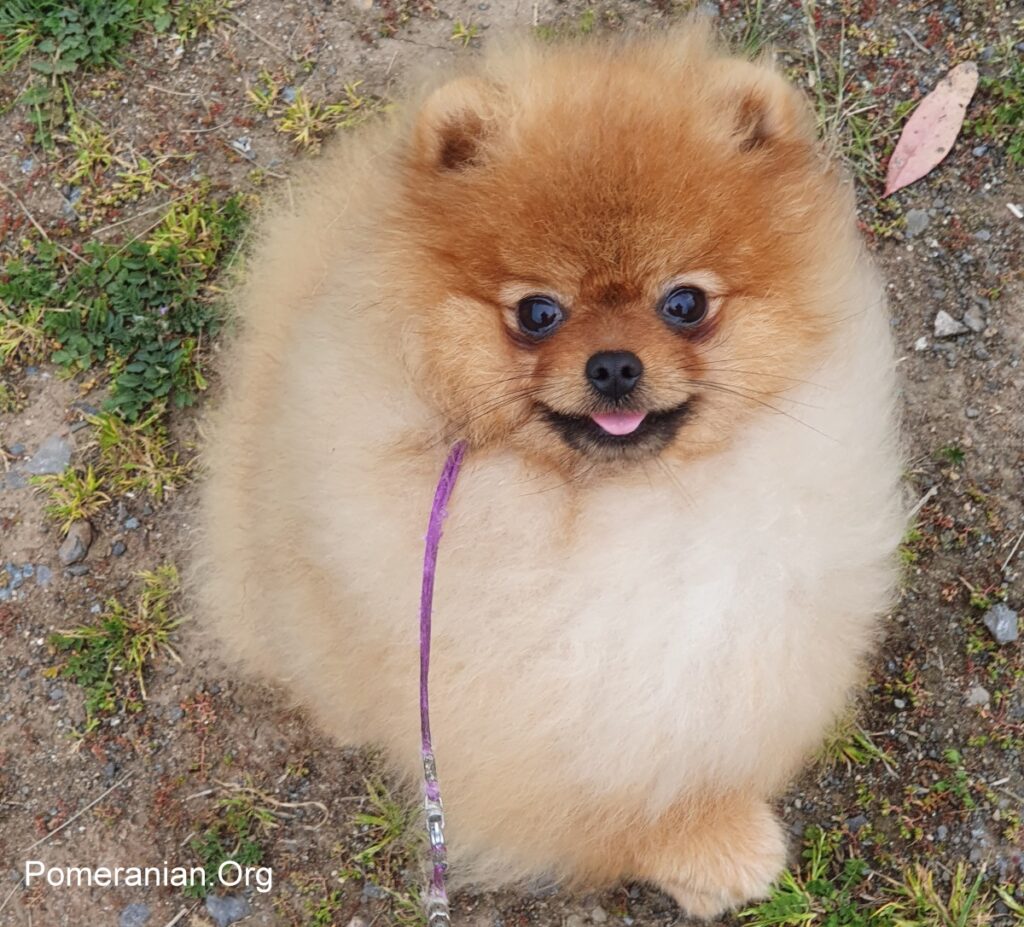
Pomeranian Teeth Care:
- Unless your Pomeranian’s teeth are cleaned regularly, your Pomeranian will suffer from early tooth loss.
- I use a toothbrush (a small, soft human one). Never use human toothpaste. You can purchase “doggie” toothpaste from your local vet clinic.
- Start cleaning your puppy’s teeth early, so he /she will learn to accept this procedure as normal. Dirty teeth will cause early tooth loss and lead to many health problems.
- Pomeranian teeth care will only take you a few minutes weekly.
Pomeranian Treats:
I do not recommend dog chews, pig ears, etc., for small dogs like Pomeranians. A sizeable raw bone from your butcher is a much safer option.
Pomeranian Grooming:
- Pomeranian Puppies should be groomed early so they learn to welcome all attention.
- The double coat of the Pomeranian does not require as much attention as some of the other coated breeds, but he does require regular grooming, at least 2 or 3 times a week, if not daily.
- Teach your baby from a young age to accept and enjoy being groomed
- Start by laying the puppy on his/her back on your lap, talk soothingly, and brush, paying attention to areas that tangle quickly, like behind the ears, armpits, etc.
- Occasional bathing is recommended with a shampoo formulated for dogs. A tearless puppy shampoo is probably the best to use. Your vet will have suitable puppy shampoos available.
- Do not use talcum powder as a dry cleaning method to clean your Pomeranian. Talcum powder is very drying and has been known to cause respiratory problems in small puppies and allergies when a scented powder is used. Think of the size of your puppy and the amount of powder used.
- A quick clean with a warm wet face washer is a much better option for the baby Pomeranian if you do not have time for a full bath and dry.
- Never leave your Pomeranian wet.
- A human hairdryer may be used, and it is a great idea to get your Pomeranian used to the noise of the hairdryer from a young age. Be careful, use a low setting, and know the dryer’s heat. When your puppy is older, consider purchasing a hair dryer for dogs.
- Trimming of hair around the anus for cleanliness is recommended.
- When you stroke or pat your Pomeranian, stroke the coat from the tail to the head, as this will raise the dense coat.
Trim Pomeranians Toenails:
- Pom Pup’s Toenails should be kept as short as possible.
- Always check the dew claws on the front and back legs, just in case your Pomeranian has back dew claws. The nails on these will need to be trimmed often.
- Trimming toenails is something that your puppy will dislike. Buy a pair of toenail clippers and start trimming the toenails when your Pomeranian is young.
- Only take a little bit off the nail every other week, so they don’t grow long, and you won’t make a mistake and cut into the quick and cause bleeding and upset the Puppy.
- Puppies with light-colored nails are easier to trim as the quick is visible. By trimming a little every other week, dark-colored nails will not be a problem.
Pomeranian Toys:
A Pomeranian loves his/her toys to play with. Certain toys are favorites. Caution must be used when allowing your Pomeranian to play with some toys.
My Pomeranians love the fur rats with the squeaker. I only allow puppies to play with these under strict supervision. A baby could get the squeaker out of the toy and swallow this object or choke on the squeaker.
Pieces of plastic from toys over time can be chewed off. I am always distrustful of plastic toys. Always check toys for small items that may prove dangerous for your Pomeranian Puppy.
Pomeranian Leash Training:
- The Pomeranian is extremely intelligent and easy to train; he is eager to please his owner. Pomeranians also excel at obedience training.
- Pomeranian leash training is best started at 10 to 12 weeks of age.
- Start using a very small collar or harness without the lead attached and coax the puppy to follow you. This is the time for tasty treats and titbits.
- Puppy will often scratch at the collar. Attach the lead once the Pomeranian baby is used to following you with only the collar. Collars on Pomeranians are not recommended. Collars can cause problems in the dense coat of a Pomeranian.
- A harness is a safer, kinder option than a collar and is only required for walking your Pomeranian.
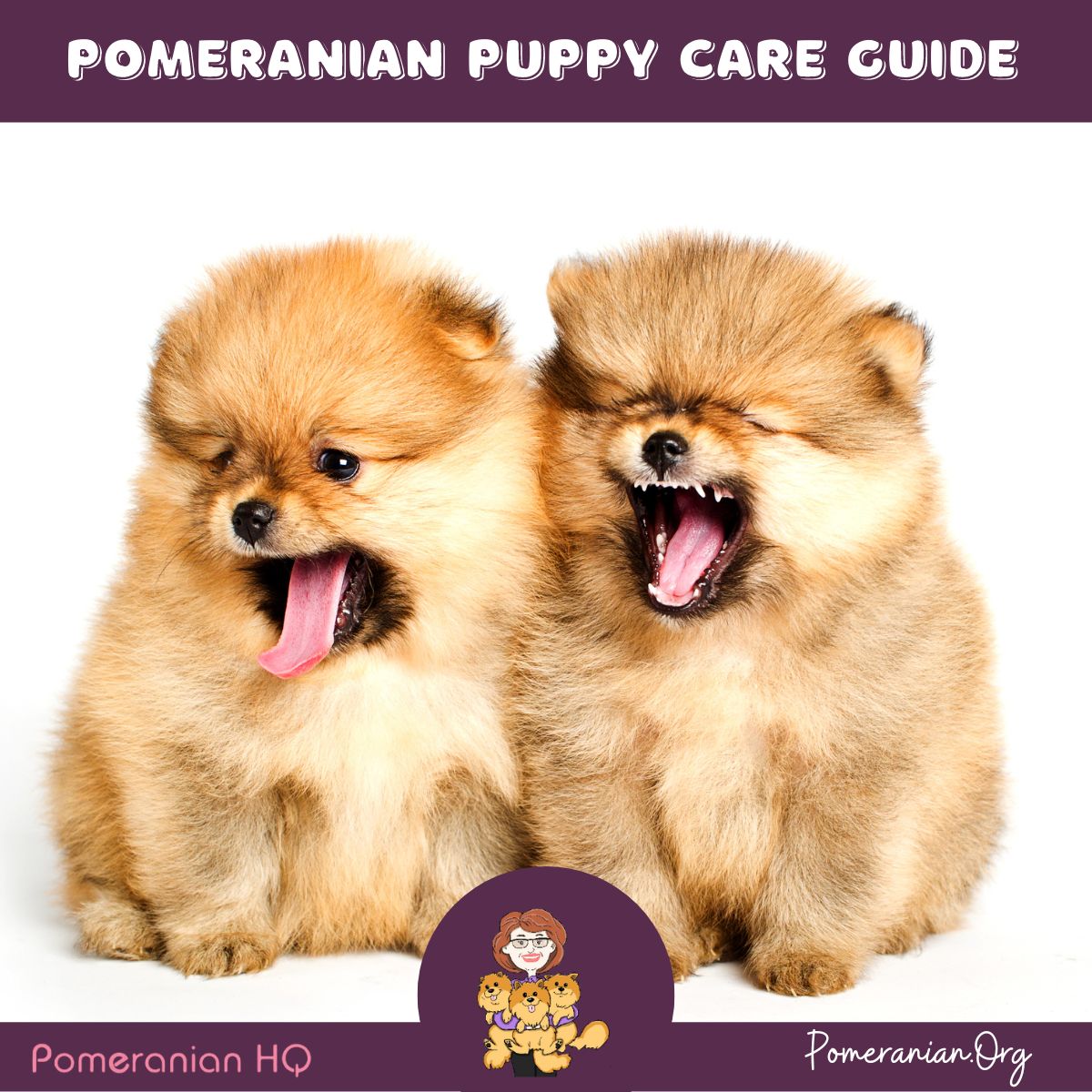
The Best Pomeranian Puppy Care Tips
The comprehensive Pomeranian puppy care guide fills a book. We offer the Pomeranian Puppy Care Booklet free to Pomeranian dog lovers.
Just sign up for the Pomeranian newsletter to obtain your FREE copy. In addition, The Pomeranian Handbook will certainly assist you through each phase of owning a Pomeranian.
Top 10 Pomeranian Care Tips:
- You must take the role of leader of the Pomeranian pack. Kindly but firmly let Pom puppy know his place in the pack.
- Bad puppy behavior must never be addressed by shouting or becoming angry. Ignoring a puppy or pup having quiet alone time is the best way to handle a naughty Pomeranian puppy. Chewing, nipping, or barking behaviors can be handled by simply shifting the pup’s attention elsewhere.
- A dog is a puppy until he turns one year old. The first year of a pup’s life passes quickly. The critical puppy learning period is the first months of a dog’s life. Very young Puppies can learn effortlessly. Don’t miss out on this opportunity to quickly educate your Pom puppy.
Communicate with your Pomeranian puppy. Playing games and learning commands and cues is great fun for owner and dog alike. Devote much time during this first year to being with the puppy. - Teaching independence and self-reliance is a very important element of Pom puppy care. Pomeranian pups can suffer from separation anxiety. Learn how to recognize the signs and deal with any separation anxiety issues. However, do not let negative thoughts spoil your day whenever you cannot be with a puppy.
- Feed an appropriate food for his age to ensure the Puppy grows strong and healthy.
- Never permit a puppy to cultivate inappropriate eating habits.
- Pom dogs have different care requirements depending on the weather conditions. Modify your Pomeranian care routine to accommodate the seasons. During summertime, your Pom puppy dog needs a cooling mat to remain comfy.
Weather-proof garments, such as boots, outdoor jackets, and coats, are likely essential for a puppy to tolerate and enjoy the outdoors on very cold days. - A Pom dog will require lots of grooming during his lifetime. Start early training your pup to enjoy grooming sessions.
- Pom puppies go through a period of growth and change known as the “ Pomeranian Uglies. “ Pomeranian puppy color may transform significantly from baby puppy to adult pom. A dark pup may lighten, and a lighter Pom puppy may darken. During the Pomeranian Puppy Uglies stage, ensures all dead coat is removed by daily Pomeranian brushing.
- Teach your Puppy the basics of potty training and lead training early. Puppy socialization should be started as soon as the puppy vaccinations are complete.
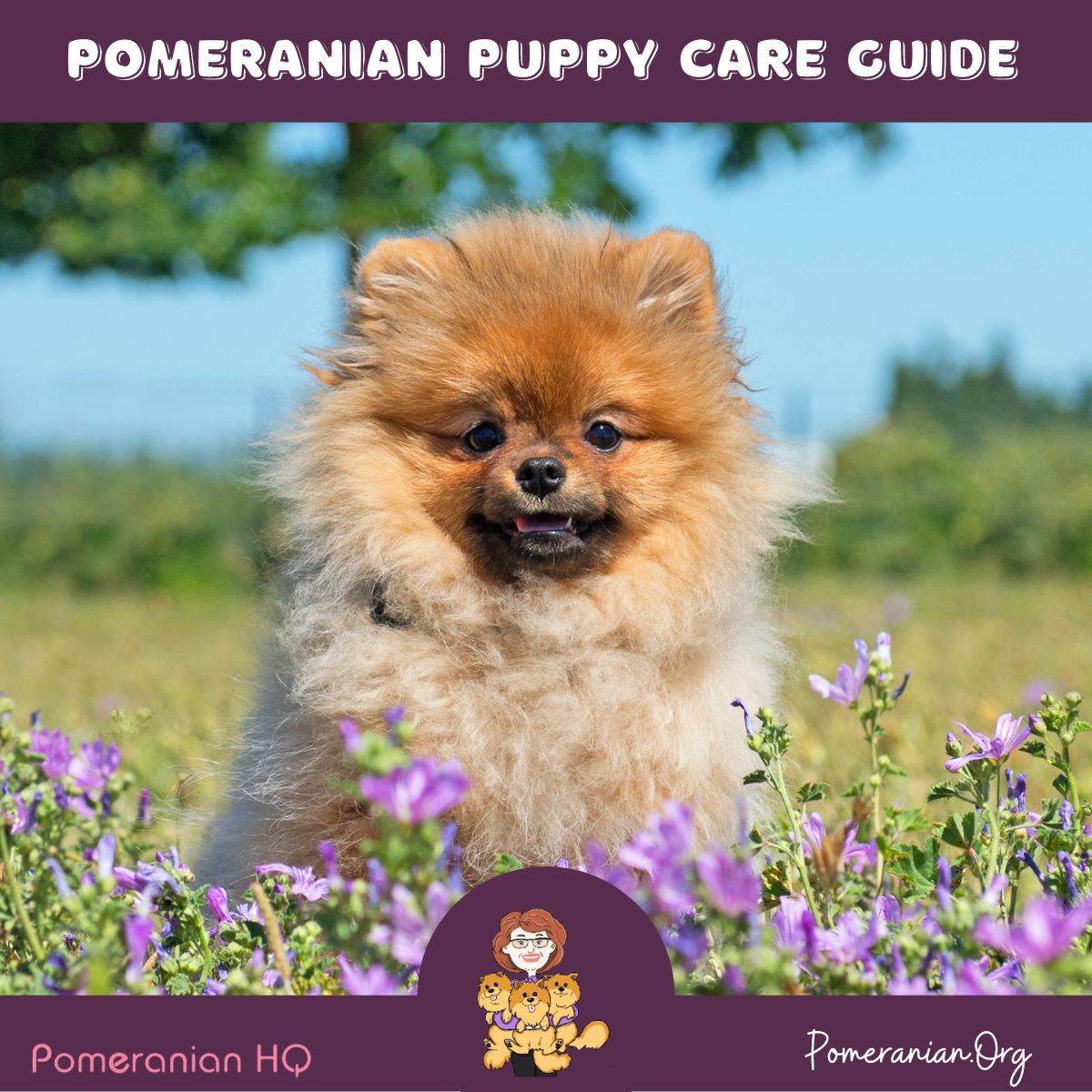
Final Thoughts on Pomeranian Puppy Care
The Pom is an awesome breed of dog. This breed comes in many patterns, markings, and colors. Pomeranians vary in size and shape. Pomeranians can have many types of Faces, including the teddy bear Pomeranian and baby-doll Pom face.
Blessed are those people who share their life with a Pomeranian dog. All Pomeranians are entitled to the very best care along with endless love. Every Pomeranian is a tiny individual.
As you can see, much work goes into caring for a Pomeranian puppy. It is essential to be prepared for all the challenges and enormous rewards that come with being a pet parent.
By following the advice in this blog post, you will be on your way to giving your Pomeranian puppy the best possible start in life.
Good luck with your new puppy. Join our newsletter and receive a free Pom puppy care sheet. Complete caring for Pomeranian puppies guide. How to care for Pomeranian dogs.
Copyright Pomeranian.org. All Rights Reserved.
References and Further Reading:
Official Standard of the Pomeranian (AKC). American Kennel Club, 2011.
English Kennel Club Pomeranian Breed Standard, 2017.
Denise Leo, The Pomeranian Handbook.
